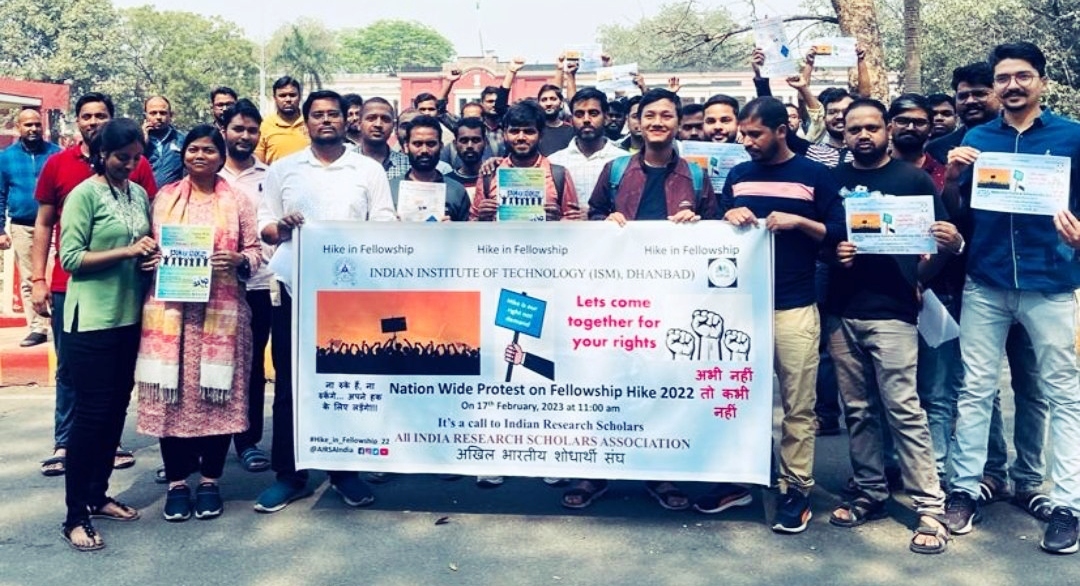
Research scholars protest at IIT-ISM Dhanbad. Photo: Twitter/@AIRSAIndia
In the second week of February 2023, Shirley M. Malcom and Sudip Parikh from the publishing group of Science magazine wrote an editorial titled, ‘Students and postdocs deserve more’ highlighting issues related to their salary and career options. Though they discuss and propose solutions in the US context, it is comparable and expandable with the Indian scenario.
Unlike many countries, regular distribution fellowship is a distant dream for organisations and students in India. While promises were made on several occasions, it is not reflected in the bank account. On average, junior research fellows must wait four-six months for their first month’s fellowship to arrive.
The release of contingency grants is another issue. It is meant for expenses on support elements for research – registration fees for conferences, field visits, and analytical charges for experiments. At present, registration fees for international conferences range from Rs 3,000-5,000, leading to the inadequacy of the grant for other activities. Each year, scholars wait with bills and fear that, as in the past, they may not get contingency grants.
Research fellowships are revised every four years – after protests. In 2019, Ashutosh Sharma, who headed the fellowship revision committee, told The Hindu that a system would be put in place to ensure the annual revision of fellowships. It has been more than four years since that statement, and on February 17, scholars demonstrated peacefully within their campuses demanding a revision.
It is a fact that research fellowships are in the country’s top 10% of the monthly income scale. So what makes scholars protest regularly for increments?
Firstly, not everyone enters research without a career break. First-generation graduates and students without economic or social capital become researchers with family responsibilities like caring for dependent members – they need to find a balance between research and familial commitments. Some institutes do not have the facilities, fee concessions, health/accidental insurance, or support systems for female researchers. A majority of research fellows in the age group 23-30 are not entitled to employee benefits that are offered in other sectors.
Importantly, due to irregular disbursement, research scholars are ineligible for availing term insurance. Hence one needs to manage the fellowship for social security schemes, savings, and investments.
Secondly, the process of knowledge creation and research communication is not limited to working hours. Overworked or underpaid is the status of researchers globally. One needs to spend hours at a stretch for an experiment, some specially done at night; 12-hour work is common, labs remain open throughout the year. Even Sundays and public holidays require work, if the experiment demands so. The lockdowns induced by the COVID-19 pandemic, and inadequate access to research facilities, put many to work without fellowships post-tenure.

Fee hikes, fellowships discontinued
On the other hand, fee hikes dissolve emergency funds. Recently, the Academy of Science Innovative Research (AcSIR) – which has more than 6,000 students from 52 research institutes – increased the thesis submission fee by 200%. Such a big jump was never seen in the past – not just in AcSIR but any other research institute with better infrastructure. In addition, unlike fellowships, a gradual increase of the semester fee of Rs 500 for each new batch of admission means that it has now reached Rs 11,000. Requests to administration remain unanswered as usual. Due to decreased career opportunities and a competitive environment, career instability is every scholar’s nightmare.
Coming to the Council of Scientific and Industrial Research (CSIR), many schemes vanished after 2020. Direct senior research fellowship (SRF), given to research assistants to continue as doctoral candidates, is one of them. It was beneficial for those who were interested in research and were financially deprived to enrol in coaching classes to train for national-level eligibility tests. Along with SRF, research associateship – which has been a support to many individuals, especially women who couldn’t leave the country for postdoctoral research – has also been dropped. Very recently, Maulana Azad National Fellowship, given to six religious minorities in the country, was also stopped. Since then, not only have many individuals lost opportunities, but Indian institutes have also lost many trained individuals, leaving the human resource development index affected.
Scholars are looking for regularisation and restart of fellowships, and the introduction of physical and mental support systems with a woman-centric approach. Authorities should come forward to have an interactive culture with students. Questions and criticism are essential in research or any organisation, but many remain one-way communication from the top. Students are scared of raising their concerns because they expect disciplinary action from supervisors and administrations. This paints a picture of the worrying state of research.
Vijayakumar Samiyappan is a final-year PhD candidate.

